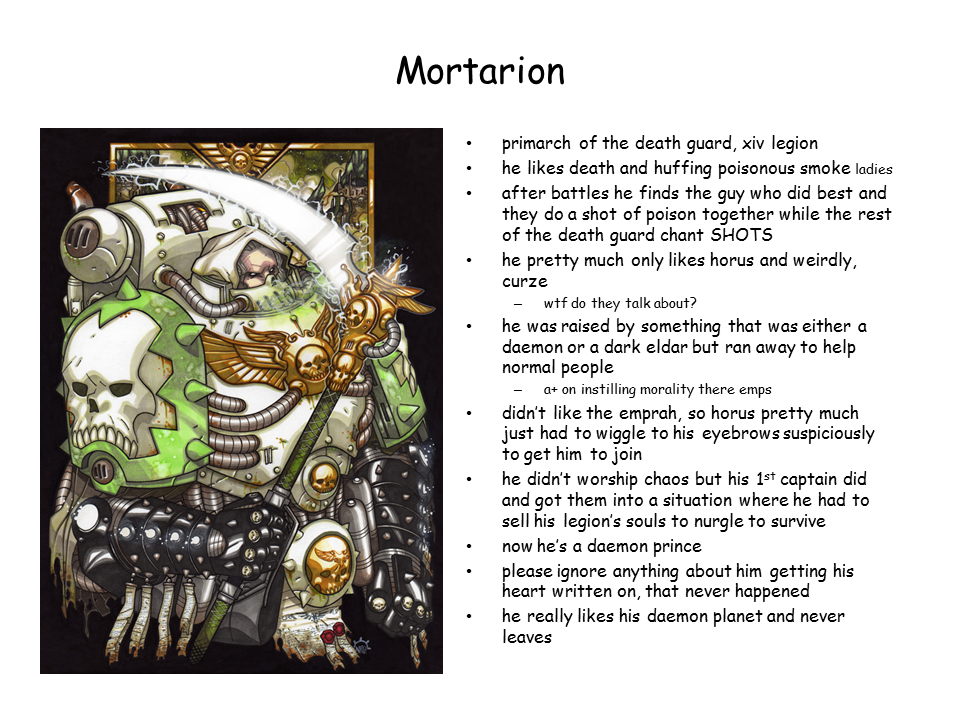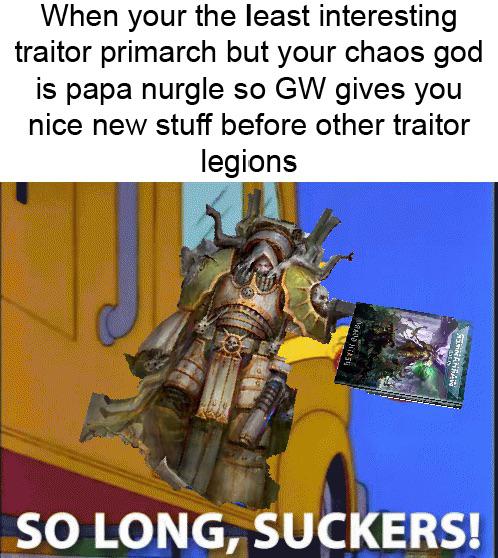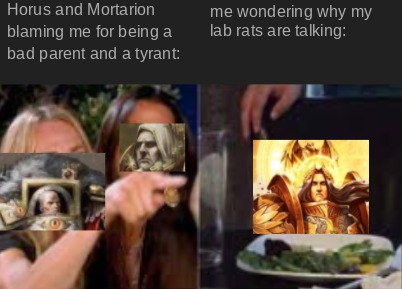When Keri and I decided to dive into the Primarch series, we divided up the primarchs based on who we were most interested in reading about. I chose Mortarion, because I have a lot of questions about old Morty. Questions I had hoped his primarch novel would answer. The book released in September last year, and I am just now reviewing. My editor is none too pleased with me, but frankly, it’s been a real struggle. Not only does it not answer my questions, I just didn’t like Mortarion: The Pale King very much. I know what you’re thinking: Jen disliked another primarch novel? Shock of shocks.

Who is Mortarion?
Mortarion is one of the primarchs that always feels a little flat. He’s morose, he’s broody, and he has some unresolved Daddy issues. I don’t say that as a flippant or trite “hur hur the primarchs have daddy issues” joke. One of Mortarion’s defining features is his dislike of his adopted father figure as well as his biological father, The Emperor. Mortarion: The Pale King mostly deals with the latter. Mortarion and the Death Guard are called to Galaspar to bring the system to heel. When he arrives he discovers World State a society that lives in abhorrent despair. Their cruel, wealthy overlords work them to death like human batteries and keep them docile with a steady stream of drugs (it’s worth noting the same drugs make the overlords more aggressive, kind of like the “pax” from Firefly). Do you get it? It’s like a mirror to the current 40k universe, you see. Too subtle? Don’t worry, the book will drive the point home more.
Mortarion and the Death Guard do not take kindly to Galaspar’s nonsense, and they reap the scythe across the planet in a brutal, horrendous manner. They essentially make the surface unlivable using viruses, radiation, and other toxins. It’s very similar to his 40k tactics, if that isn’t clear from my summary. Again, don’t worry, the book will drive that point home more. It’s so terrible, Horus and Sanguinius are sent to question Mortarion’s actions. Horus, the consummate politician, initially wants to understand his lugubrious brother. Sanguinius, on the other hand, begins and ends the book disappointed and disapproving. By the end, Horus is also disappointed in Mortarion’s brutality, and they caution him to show more restraint. Mortarion could not care less. Classic Morty.

What is Mortarion?
One of the things I’ve always enjoyed about Mortarion is that he shared Corax’s distaste for oppressors. Given his upbringing, he despises inequity and those who would cruelly subjugate their own people. In a lot of ways, Mortarion is to Corax as Konrad is to Corax—a dark mirror lacking the optimism of the Raven Guard. Whereas Corax seeks to liberate and uplift, Mortarion sees little hope and opts to flip the game board over, as it were. In that regard, the book is good at showing you Mortarion’s inner motivations. He vacillates between doleful and surly, and has little by way of hope. The Comptrolers are so awful to his sensibilities that peace was never an option. As he answers Horus’s and Sanguinius’s questions, he insists throughout that there was no way other than what he chose to do.
The biggest question I’ve always wrestled with with Mortarion was “Why?” Why does a primarch so vehemently opposed to oppressors side with a chaos god who is not only brutal in his efficiency (you might say he’s … contagious?), he offers zero choice to join his band? Why does a primarch so opposed to sorcery get neck deep in sorcery? While I’ve read The Buried Dagger, I’ll be honest that I don’t love the “he had no choice” answer offered. This book comes close to flirting with some explanation as it’s revealed that while the Emperor understood Mortarion’s actions, he was deeply disappointed in him. But that’s about as deep as we get into any sense of motivation or early corruption. Mortarion was always a gloomy prisoner of circumstance, and thus he shall ever be, apparently.

Why is Mortarion?
Yet again, I end a primarch novel with a simple question: But why? I’ve been consistently let down by this series as the books seldom offer insights into the characters that I really enjoy or want to see. In fact, off the top of my head I think the Konrad Curze, Leman Russ, and Alpharius novels might be the only ones I’ve actually enjoyed. I’m not sure if I’ve merely selected the wrong ones, or if maybe the questions I have about the primarchs are so niche and weird that the series doesn’t touch them. Or maybe this series wasn’t a great idea to begin with, especially given how long in the tooth the Horus Heresy has become.